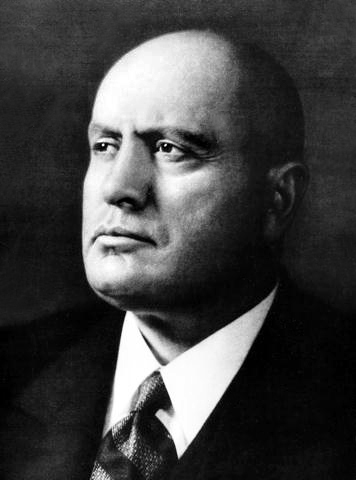Frases célebres de Benito Mussolini
Fuente: Discorsi Politici, página 64 y siguientes (citado según Tasca, página 62).
“Los ingleses, ese pueblo que piensa con el culo.”
Fuente: "Diarios 1937-1943" de Ciano, traducción íntegra en español, Memoria Crítica. Año 2004.
“Un pueblo tiene que ser pobre para poder ser orgulloso.”
Fuente: "Diarios 1937-1943" de Ciano, traducción íntegra en español, Memoria Crítica. Año 2004.
Frases de vida de Benito Mussolini
Frases de fe de Benito Mussolini
Fuente: Opera Omnia II, pg. 5.
Fuente: Opera Omnia VI, pp. 114-115.
Fuente: Il Popolo D'Italia del 2 de julio de 1921, citado por Tasca, página 367.
Benito Mussolini Frases y Citas
Fuente: Il Popolo D'Italia, del 3 de julio de 1920 (citado según Tasca, página 162).
“Si llego al poder, volveré la ametralladora contra los fascistas si no se someten a la cordura.”
Sin fuentes
Benito Mussolini en conversación sostenida con en el verano de 1921 con los jefes del liberalismo italiano, citado según Tasca, página 177.
“Hay dos cosas con las que uno no puede luchar; contra la Iglesia y las modas de las mujeres.”
Sin fuentes
Mussolini, en Bordighera, dirigiéndose a Franco (1941).
“Envidio a Hitler. Él no tiene que arrastrar vagones vacíos.”
Refiriéndose a la monarquía.
Fuente: "Diarios 1937-1943" de Ciano, traducción íntegra en español, Memoria Crítica. Año 2004.
“La masa es descartable, hombres grises.”
Sin fuentes
Frase dicha durante la reunión Con Salazar y el ministro Kappra de 1938.
Fuente: "Diarios 1937-1943" de Ciano, traducción íntegra en español, Memoria Crítica. Año 2004.
Fuente: Entrevista al Giornale d’Italia después de la fundación del Fascio de Combate de Milán.
Benito Mussolini: Frases en inglés
As quoted in The Ideology of Fascism: The Rationale of Totalitarianism, A. James Gregor, New York and London, The Free Press (1969) p. 106
Undated
My Autobiography by Mussolini, New York: NY, Charles Scribner’s Sons (1928) p. 280.
1920s
As quoted in Mediterranean Fascism 1919-1945, edit., Charles F. Delzell, The MacMillian Press (1970) p. 23. Speech given on June 21, 1921 in Italy’s Chamber of Deputies.
1920s
Quoted in The Making of Fascism: Class, State, and Counter-Revolution, Italy 1919-1922, Dahlia S. Elazar, Westport, CT, Praeger, 2001, p. 141 and in Fascism in Ferrara, 1915-1925, Paul Corner, New York, NY, London: UK, Oxford Univ. Press, 1975, p. 193, n.5, Pact of Pacification, 1921
1920s
As quoted in The Myth of the Nation and the Vision of Revolution, J.L. Talmon, University of California Press (1981) p. 492. Original source: Mussolini, Opera Omnia VI, p. 427, 1914
1910s
As quoted in The Myth of the Nation and the Vision of Revolution: The Origins of Ideological Polarization in the 20th Century, Jacob Talmon, University of California Press (1981) p. 487
Undated
As quoted in Talks with Mussolini , Emil Ludwig, Boston, MA, Little, Brown and Company (1933) p. 38. Interview between March 23 and April 4, 1932, at the Palazzo di Venezia in Rome https://archive.org/details/talkswithmussoli006557mbp
1930s
Speech on November 14, 1933 as quoted in Under the Axe of Fascism, Gaetano Salvemini, London, UK, Victor Gollancz Ltd. (1936) p. 131
1930s
Mussolini's last words (28 April 1945), as quoted in "Mussolini" by Peter Neville,(2004) p. 195
1940s
Mussolini and Fascism (2003) by Patricia Knight, p. 46
Undated
“Men do not move mountains; it is only necessary to create the illusion that mountains move.”
As quoted in The Great Illusion, 1900-1914, Oron J. Hale, Harper & Row (1971) p. 109
Undated
As quoted in Three Faces of Fascism: Action Française, Italian Fascism, National Socialism, Ernst Nolte, New York: NY, Holt, Rinehart and Winston (1966) p. 156. Opera Omnia di Benito Mussolini, V, p. 121
Undated
Remarks to Count Ciano (11 January 1939) after meeting Neville Chamberlain and Lord Halifax, quoted in Malcolm Muggeridge (ed.), Ciano's Diary, 1939–1943 (1947), pp. 9–10
1930s
“A revolutionist is born, not made.”
Talks with Mussolini, interviewer Emil Ludwig, Boston: MA, Little, Brown and Company, 1933, p. 66. Interview took place between March 23 and April 4, 1932
1930s
1900s, God Does Not Exist (1904)
1900s, God Does Not Exist (1904)
1900s, God Does Not Exist (1904)
1900s, God Does Not Exist (1904)
1900s, God Does Not Exist (1904)
“The struggle against the religious absurdity is more than ever a necessity today.”
1900s, God Does Not Exist (1904)
1930s
Fuente: Letter to Hitler, quoted in Winston Churchill's The Gathering Storm
Speech held in Trieste (September 18, 1938)
Fuente: Il discorso di Trieste, archivioluce, 2021-01-04 https://www.archivioluce.com/2019/09/18/il-discorso-di-trieste/,
